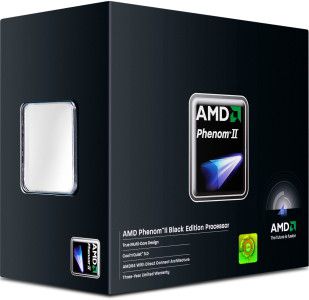From our front-page news:
AMD has today announced five new AM3-based processors that we've been expecting to see for a few months now. These new chips perfectly follow-up to the company's Phenom II launch last month, which featured two Quad-Cores, the X4 940 and X920. Today's releases feature three more Quad's, and two Tri's, all of which are priced very competitively to Intel's offerings.
The top model of the new releases is the X4 910, which at 2.6GHz, settles right below the X2 920 at 2.8GHz. Like its bigger brothers, the 910 features 6MB of L3 Cache. Also introduced today are the 800 series, including the X4 810 and X4 805. Both models are Quad-Cores, but feature slightly less cache than the 900 series, with 4MB L3 Cache. These models are clocked at 2.6GHz and 2.5GHz, respectively.
On the Tri-Core side of things, we have the X3 720 Black Edition, which AMD promises to be one heck of an overclocker (they expect people will have even better luck overclocking this chip than they do with the X4 940). Given this chip clocks in at 2.8GHz, it's going to be plenty fast even without overclocking. The X3 710 becomes AMD's current lowest-end AM3 offering, at 2.6GHz. Despite the missing core, these Tri's still include 6MB of L3 Cache like the 900 series, so in some regards, they may even out-perform the 800-series Quad's in certain scenarios.
One of the biggest new features of the AM3 platform is DDR3 support, and although it really wasn't that needed (the differences are mostly moot for most people), it's nice to now have the option. The best part of AM3 is that it still natively supports DDR2 as well, and can also be used in all AM2+ motherboards. So, if you don't want to upgrade to an AM3 motherboard right now (and it seems like you shouldn't), you can still pick up a new chip and use it in your current motherboard. AM2 boards might work in some cases, but you'd want to do some reading up on it first to make sure.
We're running a little behind here, but you can expect our review of the X4 810 and X3 720 BE later this week. Stay tuned...

AMD (NYSE: AMD) extended the value and lifespan of its heralded Dragon platform technology today with five new additions to its AMD Phenom II processor family, including the industry's only 45nm triple-core processors and three new AMD Phenom II quad-core processors. These AMD Phenom II processors deliver choice and lay the foundation for memory transition; they fit in either AM2+ or AM3 sockets and support DDR2 or next generation DDR3 memory technology. AMD continues to enhance the Dragon platform technology value to OEM and channel partners as well as Do-It-Yourself (DIY) consumers who build and customize their own PCs.
Source: AMD Press Release
The top model of the new releases is the X4 910, which at 2.6GHz, settles right below the X2 920 at 2.8GHz. Like its bigger brothers, the 910 features 6MB of L3 Cache. Also introduced today are the 800 series, including the X4 810 and X4 805. Both models are Quad-Cores, but feature slightly less cache than the 900 series, with 4MB L3 Cache. These models are clocked at 2.6GHz and 2.5GHz, respectively.
On the Tri-Core side of things, we have the X3 720 Black Edition, which AMD promises to be one heck of an overclocker (they expect people will have even better luck overclocking this chip than they do with the X4 940). Given this chip clocks in at 2.8GHz, it's going to be plenty fast even without overclocking. The X3 710 becomes AMD's current lowest-end AM3 offering, at 2.6GHz. Despite the missing core, these Tri's still include 6MB of L3 Cache like the 900 series, so in some regards, they may even out-perform the 800-series Quad's in certain scenarios.
One of the biggest new features of the AM3 platform is DDR3 support, and although it really wasn't that needed (the differences are mostly moot for most people), it's nice to now have the option. The best part of AM3 is that it still natively supports DDR2 as well, and can also be used in all AM2+ motherboards. So, if you don't want to upgrade to an AM3 motherboard right now (and it seems like you shouldn't), you can still pick up a new chip and use it in your current motherboard. AM2 boards might work in some cases, but you'd want to do some reading up on it first to make sure.
We're running a little behind here, but you can expect our review of the X4 810 and X3 720 BE later this week. Stay tuned...

AMD (NYSE: AMD) extended the value and lifespan of its heralded Dragon platform technology today with five new additions to its AMD Phenom II processor family, including the industry's only 45nm triple-core processors and three new AMD Phenom II quad-core processors. These AMD Phenom II processors deliver choice and lay the foundation for memory transition; they fit in either AM2+ or AM3 sockets and support DDR2 or next generation DDR3 memory technology. AMD continues to enhance the Dragon platform technology value to OEM and channel partners as well as Do-It-Yourself (DIY) consumers who build and customize their own PCs.
Source: AMD Press Release

